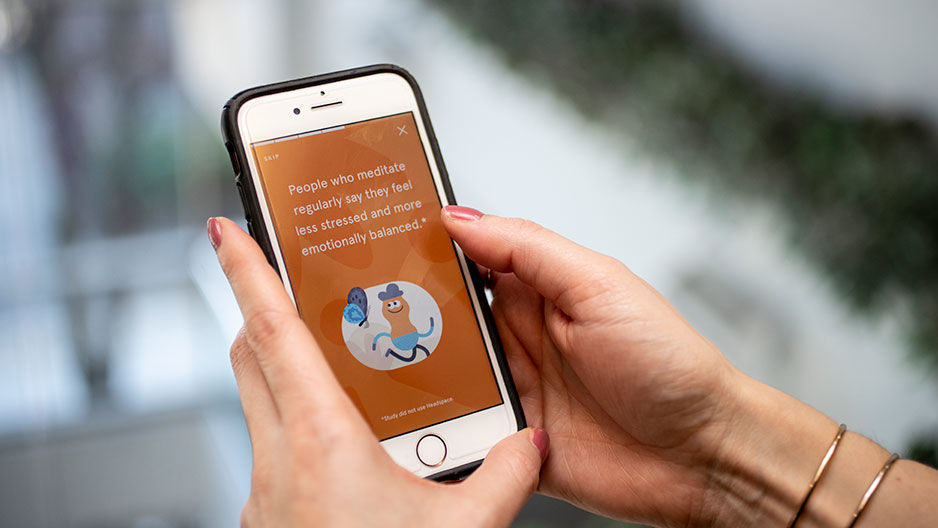Help yourself: Group therapy, mindful meditation app benefit students by the hundreds
Tuttleman Counseling Services offers far more than just one-on-one therapy: Students have found comfort and useful tools in group therapy sessions and the Resiliency Resource Center, a space offering a variety of self-care tools.

What if there were advisors who could help you manage more than just your class schedule, but also whatever life throws at you, from tough coursework to relationship conflicts to anxiety and depression?
Sounds pretty useful, right?
Good news: This isn’t a hypothetical. There are people and resources here to give you the tools to manage those tricky-to-navigate feelings and challenges that inevitably come up in life—and they’re just a short walk from your classes or residence hall at Tuttleman Counseling Services and its companion, the Resiliency Resource Center (RRC), at 1700 North Broad.
Tuttleman and the RRC are far more than just individual therapy sessions: They offer a vast array of therapy groups centered on various topics, as well as resources including guided meditation, massage chairs, yoga classes, self-help books, and even a brain-sensing headband that can give you biofeedback about your own mind. Tuttleman and the RRC offer many evidence-based and research-proven strategies that can help.
Your “advisor” will be a professional counselor you’ll meet for a walk-in clinic triage appointment. All students seeking to utilize resources at Tuttleman and the RRC must first complete a triage session so a counselor can talk with them and tailor a plan specific to their needs.
“It’s like using an academic advisor to determine the right fit for a course,” explained Brandon LaBarge, a Tuttleman counselor and assistant coordinator of the RRC. Senior staff psychologist Maria Drvoshanov added: “It’s a collaboration with a therapist who is making a clinical judgment: Is this appropriate, and can you benefit?”
Once triage is complete, students for whom group therapy and the RRC are deemed appropriate (they can benefit most people, Drvoshanov and LaBarge say) will have access to an array of options, including yoga and meditation classes, drop-in and sign-up group therapy, and the RRC. Read on to learn more about the offerings.
Group Therapy
Group therapy at Tuttleman is offered in two forms: drop-in, which typically runs in eight-week sessions focused on various topics and allows approved students to show up for any session they choose, and sign-up, which typically runs the length of a semester or academic year, requires attendance, and is the same group of students for the duration.
“Students learn the skills to cope with anxiety, depression, relationship concerns, you name it,” said Drvoshanov, who runs some of the sessions. “These are skills we all need to have and could benefit from, but aren’t always taught.”
Tuttleman offers seven drop-in groups in 12 offerings each week, in addition to its sign-up groups. All group therapy is rooted in evidence-based treatment, and completing an entire eight-week series is essentially a comprehensive treatment, LaBarge said.
In the two and a half years since Tuttleman first began offering drop-in group therapy as an option, it has gained popularity, with the number of students utilizing the service constantly increasing. Hundreds of students use group therapy each semester.
“On average, each academic year, we’re adding another group,” Drvoshanov said. “We’re also consistently revamping groups using the anonymous feedback we collect.”
The group therapy options at Tuttleman allow students to tailor their counseling experience to what they need and what works for them and their schedules—all they need to bring is an open mind and a willingness to commit.
For students who might be hesitant about receiving therapy in a group setting, Drvoshanov and LaBarge say that’s understandable and not unusual—but they encourage everyone to give it a shot.
“I always acknowledge to students, ‘You came here because you wanted something to be different,’” LaBarge said. “Now you just need to manage your expectations and trust this, which is understandably challenging.”
Drvoshanov said she often eases students’ anxiety about the group setting by reminding them: Nothing is required in groups but showing up. “I say, ‘Hey, you don’t even have to talk.’ And then sometimes, they get in there and they’re one of the most talkative people in the room” once they become comfortable with the setting, she said.
If a student feels group isn’t working for them after trying it, they can talk to a counselor about their needs and concerns.
“After you make a commitment, if it’s not getting better, you’re already here,” Drvoshanov said. “There is flexibility.”
Another part of the beauty of group sessions? They connect students wrestling with similar issues.
“In a group recently, two students identified the same difficulty and were able to help each other problem-solve,” Drvoshanov said. “It helps them realize, ‘I’m not alone in these struggles.’”
Examples of Tuttleman’s drop-in skill-based group therapy sessions (see more):
Live Well Group
Sessions: Suffering is Optional, The Mind Train, Avoidance, You Are Not Your Thoughts, Observing Your Experience, Willingness, Choosing Your Values, Committing To It
Healthy Connections Group
Sessions: Healthy vs. Unhealthy Relationships, Healthy Communication, Love Languages, Fighting Fair, Getting Your Needs Met, Boundaries, Endings, Taking Care of You
Examples of Tuttleman’s sign-up group therapy topics (see more):
Sex, Love, and Relationships
Queer-Identified Process Group
Chronic Illness and Medical Issues Group
Graduate Student Group
Grief and Loss Group
Yoga and meditation group sessions:
Stress Less Yoga
Breathe
Reiki Share
Trauma-Sensitive Yoga (sign-up group)
Resiliency Resource Center (RRC)
The Resiliency Resource Center (RRC), which began at Temple seven years ago, offers separate and alternative therapy options focused on self-care.
Junior and senior psychology students act as interns in the center, which assistant coordinator LaBarge says can help students with everything from general anxiety to test-taking stress to prepping for a job interview. Resources offered include massage chairs, an exercise bike, mindful coloring, aromatherapy, calming music, self-help books, bright-light therapy, biofeedback devices and iPods equipped with the self-guided meditation app Headspace.
LaBarge said the RRC recently started offering Headspace to students who use the center because the app, which is based on research, helped him personally and is one of the most comprehensive meditation apps on the market.
“It has changed my life, the way I manage stress and do this work,” LaBarge said. “There are a lot of meditation apps, but Headspace has been one of the most consistently well-rounded.”
LaBarge said Headspace offers various packages that cover topics including anxiety, grief, sadness, relationships, healthy eating and sleep. The app also offers “SOS” sessions for moments when someone is feeling overwhelmed or panicky and needs time to recenter.
“It’s like a gym membership for your mind,” LaBarge said.
But, Drvoshanov added, “Like the gym, you have to use it and be consistent if you want it to work.”
Hundreds of students access and benefit from the resources offered at Tuttleman and the RRC every semester. “You just need to come with openness and curiosity to try new things,” Drvoshanov said.
The programs are built to be combined and tailored to individual students’ needs, rooted in evidence-based practice of psychoeducational therapy.
“The psychoeducational part is like the recipe,” LaBarge said. “The experiential part is the cooking—do I like the taste and is this something I want to try again? That’s what it’s about.”
—Morgan Zalot
